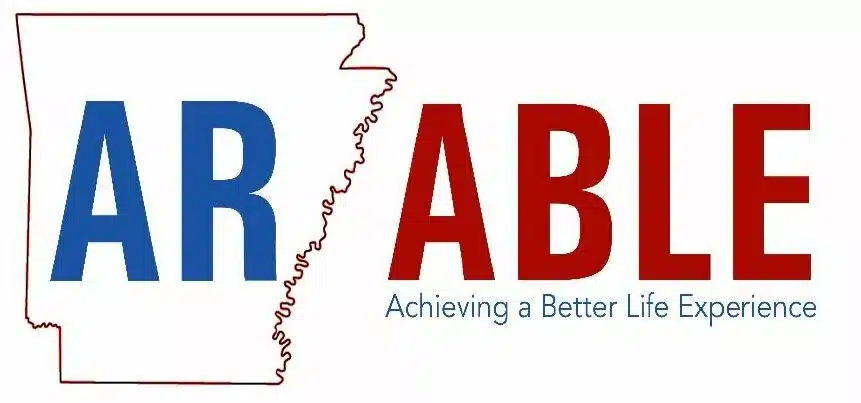
Achieving a Better Life Experience
A program administered by the Treasurer of State’s office.
Click here to access a PDF full of great information on ABLE accounts in Arkansas.
Visit AR Treasury to learn more: https://www.artreasury.gov/programs-2/able-accounts/
Visit Save with ABLE to to apply for an Arkansas ABLE Account: https://savewithable.com/ar/home.html
With your Arkansas ABLE account you will have a Fifth Third Bank checking option. You can contribute to an FDIC-insured checking account that lets you withdraw money using a debit card. So you can easily use your funds for everyday expenses.
Locate ‘partner’ ATM’s with Fifth Third Bank. These ATMS are in Arkansas and located within retail shops and gas stations.
CLICK HERE TO LOCATE CENTRAL ARKANSAS ATMs TO ACCESS YOUR AR ABLE FUNDS
What is an ABLE account?
ABLE Accounts are tax-advantaged investment accounts that help qualified individuals with disabilities and their families save for disability-related expenses. Contributions to the account made by any person (the account beneficiary, family and friends) will be made using post-tax dollars and will not be tax-deductible on the federal level. However, Arkansas law allows for state income tax deductions of up to $5,000 per individual for contributions made to an Arkansas ABLE account. Anyone can contribute to an individual’s ABLE account, up to $17,000 in any given tax year. Additionally, the funds in the account are not taken into consideration when determining eligibility for federally-funded benefits such as Supplemental Security Income (SSI) and Medicaid.
Cumulatively, up to $100,000 in savings within an ABLE account is disregarded as a resource and will NOT affect Supplemental Security Income (SSI).
Why the need for ABLE accounts?
Millions of individuals with disabilities and their families depend on a wide variety of public benefits for income, health care, food and housing assistance. Eligibility for many of these public benefits (SSI, SNAP, Medicaid) require meeting a means or resource test that limits eligibility to individuals to report more than $2,000 in cash savings, retirement funds and other items of significant value. To remain eligible for these public benefits, an individual must remain poor. For the first time in public policy, the ABLE Act recognizes the extra and significant costs of living with a disability and provides a useable savings tool.
Who is eligible to open an ABLE account?
The ABLE Act limits eligibility to individuals with significant disabilities with an age of onset of disability before the age of 26.* If you meet the age criteria and are also receiving benefits already under SSI and/or SSDI, you are automatically eligible to establish an ABLE account. If you are not a recipient of SSI and/or SSDI, but still meet the age of onset disability requirement, you could still be eligible to open an ABLE account if you meet Social Security’s definition and criteria regarding significant functional limitations and receive a letter of certification from a licensed physician. You need not be under the age of 26 to be eligible for an ABLE account. You could be over the age of 26, but must have had an age of onset before your 26th birthday.
*The ABLE Age Adjustment Act, which increases the age of onset from 26 years to 46 years, was adopted in December 2022. This new eligibility age will go into effect beginning in 2026. Arkansas ABLE intends to
adopt this change through State Legislative approval.
To find out more, contact Fran or Chris at AR ABLE, Arkansas State Treasurer’s office.
Fran Jansen, Director
[email protected]
(501) 682-1391
Chris Scott, Manager
[email protected]
(501) 682-1406
The ABLE National Resource Center (ABLR NRC)
The ABLE National Resource Center (ABLR NRC) is the leading, comprehensive source of objective, independent information about federal- and state-related ABLE programs and activities, including guidance on tax-advantaged ABLE savings accounts. Our mission is to educate, promote and support the positive impact ABLE can make on the lives of millions of Americans with disabilities and their families. ABLE NRC is a collaborative that brings together the investment, support and resources of some of the country’s largest and most influential national disability organizations in an effort to accelerate the design and availability of ABLE accounts to meet the needs of individuals with disabilities and their families.
Visit the ABLE National Resource Center website here.
History of the ABLE Act
The Achieving a Better Life Experience (ABLE) Act of 2013 (S. 313/H.R.647) was introduced in the 113th Congress by a bipartisan group of Congressional Champions that included Sens. Robert Casey, Jr. (D-PA) and Richard Burr (R-NC), and Reps. Ander Crenshaw (R-FL), Chris Van Hollen (D-MD), Cathy McMorris Rodgers (R-WA) and Pete Sessions (R-TX).
On December 3, 2014, the ABLE Act passed in the U.S. House of Representatives (404-17). Two weeks later, on December 16, the U.S. Senate voted to pass the ABLE Act as a part of the Tax Extenders package, a group of more than 50 tax breaks that expired at the end of 2013. On Friday, December 19, 2014, President Barack Obama signed the Tax Extenders package, making the ABLE Act the law of the land.
The ABLE Act amends Section 529 of the Internal Revenue Service Code of 1986 to create tax-free savings accounts for individuals with disabilities. By making tax-free savings accounts available to cover qualified disability-related expenses (including education, housing and transportation), this law aims to ease financial strains faced by individuals with disabilities. Additionally, the funds contributed into these accounts will not negatively impact the person’s eligibility for public benefits, such as Medicaid. The funds in these accounts don’t replace benefits provided through private insurances, the Medicaid program, the Supplemental Security Income program, the beneficiary’s employment and other sources. Instead, the funds supplement these benefits.
Use the links below to view the legislative summary of H.R. 647:



